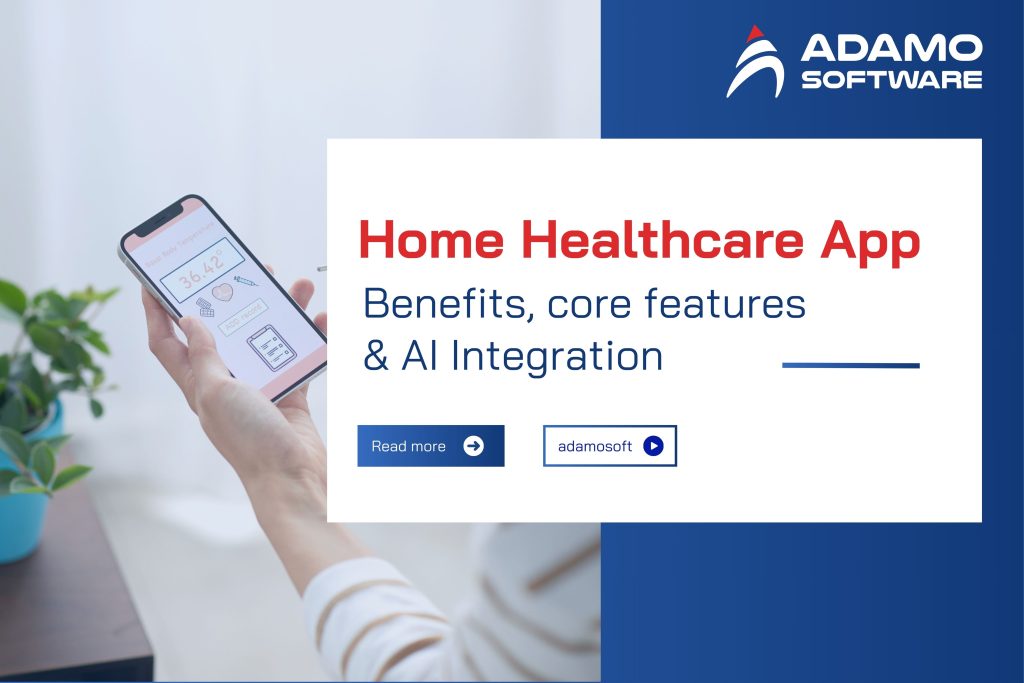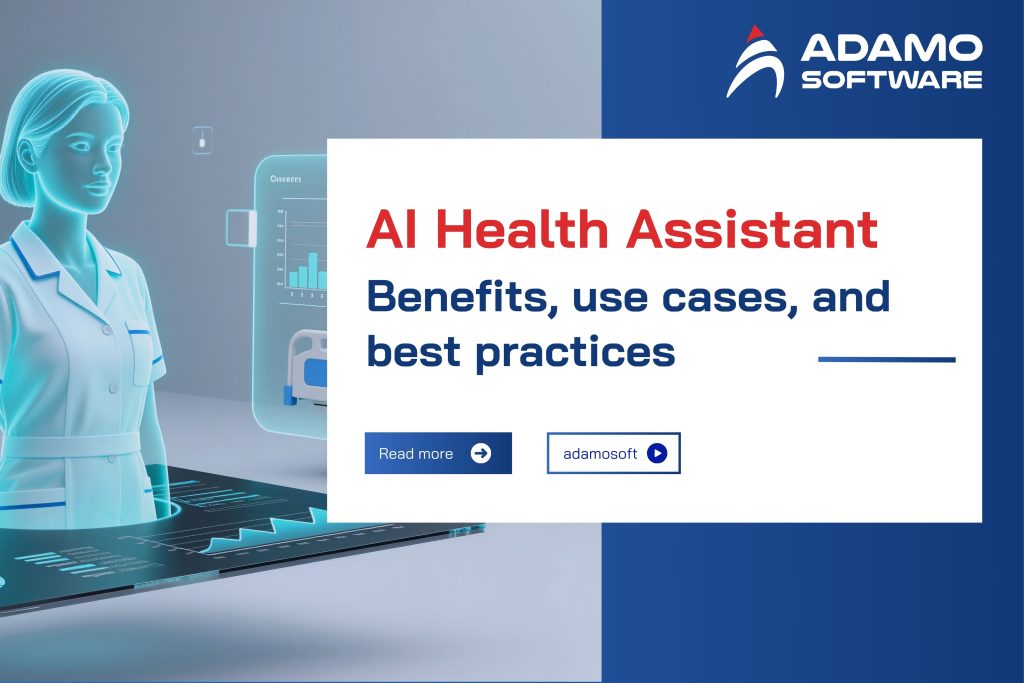Outsourcing Healthcare Software Development: Here’s when it works
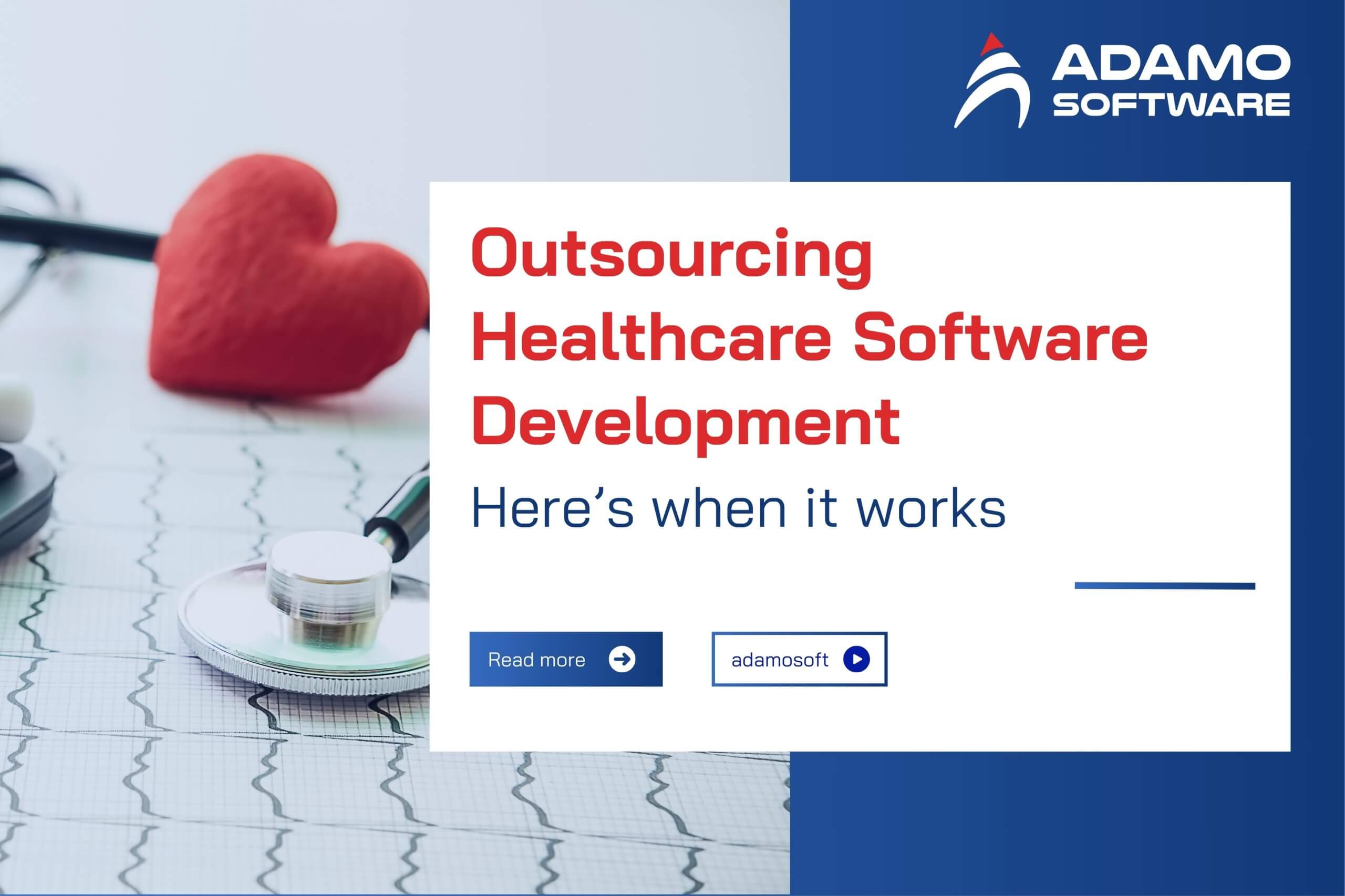
Wondering how much outsourcing healthcare software development costs? Get a full breakdown of pricing, platforms, and location-based rates.
In today’s digital landscape, developing healthcare software has become an essential task for healthcare facilities and other businesses working in the healthcare industry. This software helps them enhance service quality and streamline operating processes. However, not all businesses have enough resources to develop software. Thus, outsourcing healthcare software development is helpful in this case. So, when is outsourcing suitable for your business? Let Adamo Software discuss this question.
Through this blog post, you will find out the following pieces of information.
- Who is suitable for Outsourcing Healthcare Software Development?
- When should businesses Outsource Healthcare Software Development?
- How a reliable Outsourcing Healthcare Software Development Provider can meet business requirements
- Future Trends in Healthcare IT Outsourcing
All of the information has been thoroughly researched and updated to the latest trends. So, let’s read our blog post and find some useful information!
I. Who is suitable for Outsourcing Healthcare Software Development?
Outsourcing healthcare software development is an ideal solution for organizations that aim to innovate quickly and control expenses effectively. Below are some organizations that need this service.
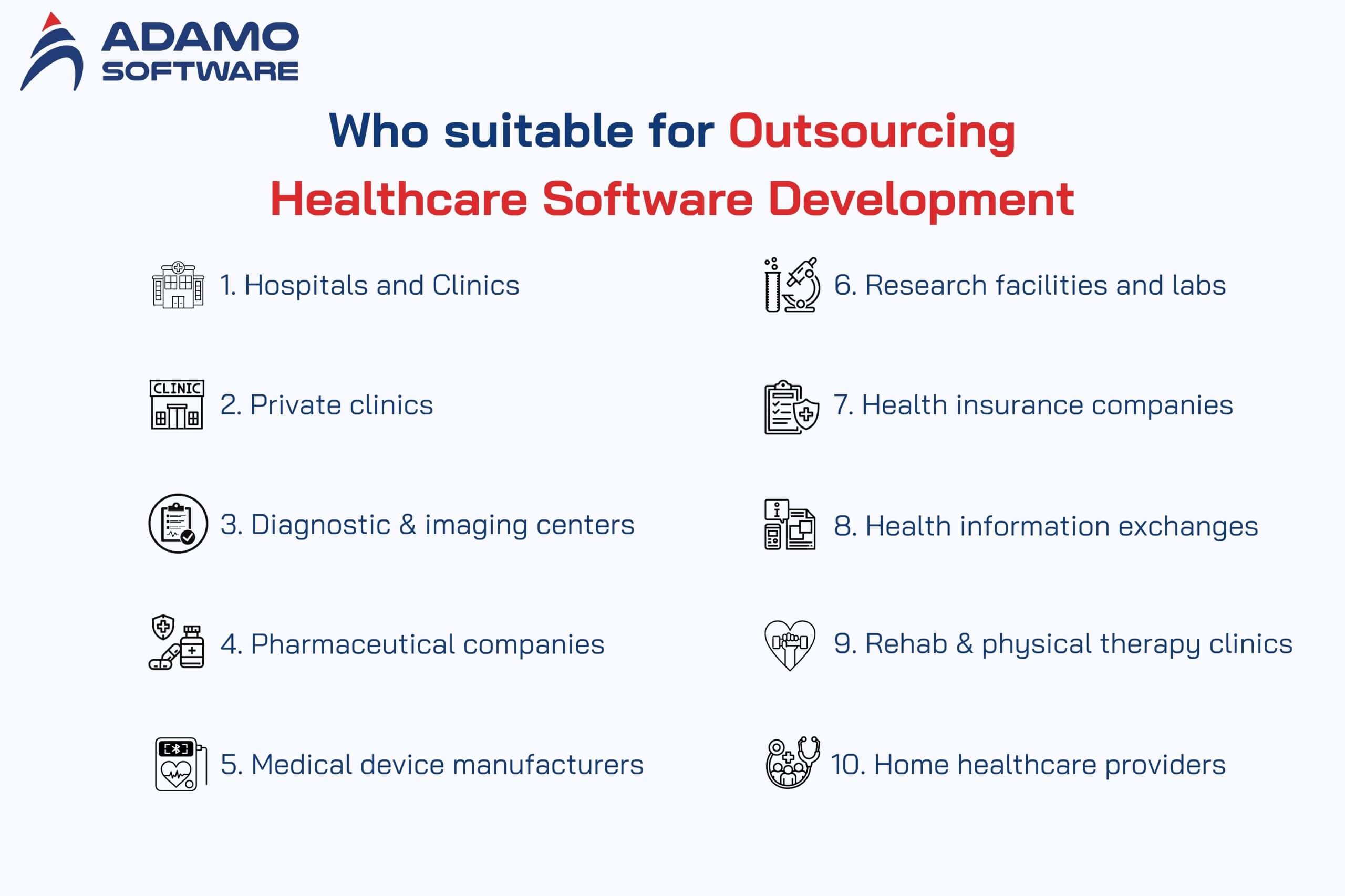
1. Hospitals and Clinics
Hospitals and clinics need the outsourcing healthcare development services to save costs and time in developing healthcare technology solutions. This helps them streamline patient data processes and operational efficiency.
2. Private Practices
Private practices often have limited resources; therefore, outsourcing healthcare development is helpful for them to access advanced technology at reasonable prices. They can use this service to deploy specialized software solutions.
3. Diagnostic and Imaging Centers
Diagnostic and imaging centers need this service to develop or integrate advanced diagnostic tools into diagnostic imaging. This helps them enhance diagnostic accuracy and optimize workflows.
4. Pharmaceutical Companies
By outsourcing healthcare software development, pharmaceutical companies can speed up research and production and process clinical trials and research data. They need to outsource to manage clinical studies, track supply chains, and comply with strict regulations.
5. Medical Device Manufacturers
Medical device manufacturers also need to use outsourcing healthcare software development services. This helps them develop software that operates or interfaces with medical devices.
6. Research Facilities and Labs
Research Facilities and Labs use an outsourcing service to build the data management system, analyze the results, and automate the experimental process. This enables them to concentrate on their research expertise while maintaining accurate, secure, and efficient information processing.
7. Health Insurance Companies
Processing claims and managing patient records can be two aims for health insurance companies to use outsourcing healthcare software development. Besides, outsourcing helps them analyze user data easily and enhance operational efficiency.
8. Health Information Exchanges (HIEs)
Health Information Exchanges (HIEs) need the outsourcing healthcare software development service to build integrated systems that securely and standardized share data across healthcare organizations. Thanks to this, they can ensure compatibility, high security, and compliance with strict healthcare privacy regulations.
9. Rehab and Physical Therapy Clinics
Outsourcing healthcare software development enables rehabilitation and physical therapy clinics to develop applications that track treatment progress, schedule appointments, and facilitate patient communication. This helps them improve care efficiency, personalize treatments, manage patient care, and progress more easily.
10. Home Healthcare Providers
Home health care providers need outsourcing to coordinate care and manage patient information remotely. This allows them to improve service quality and monitor patient conditions in real time.
Also read:
Why should businesses invest in Healthcare Software Development Services?
Top 10 common Types of Healthcare Software and trends for 2026
II. When should a business Outsource Healthcare Software Development?
Outsourcing healthcare software development depends on costs, long-term strategy, and internal capabilities of the business. Below are four situations where outside expertise is beneficial.
- Your in-house team is overextended, lacking experienced staff
- Your product roadmap can’t keep pace with the latest innovation
- Regulatory compliance demands a full-time commitment
- Cost reduction is a top priority
Let’s dive into each situation with Adamo Software!
1. Lack of experienced staff
Healthcare facilities or businesses specialized in the healthcare industry may not have enough experienced in-house staff to help them develop their own healthcare software. According to Deloitte’s 2025 survey, more than half (58%) of healthcare executives anticipate workforce challenges, such as skills gaps and the need for upskilling. This shows that many businesses may find it hard to develop the software effectively.
This situation is a huge challenge for healthcare firms. In this case, outsourcing healthcare software development is a solution.
Thanks to this, you can access experienced resources by collaborating with external teams, optimize costs, and shorten implementation time. With outsourcing, you can tackle projects like modernizing old systems or developing an AI-based diagnostic tool without the delay of searching for the ideal staff.
2. The product roadmap lacks innovation
Beyond treatment, healthcare now focuses on delivering amazing patient experiences through intuitive digital solutions. Healthcare facilities now have a high demand for seamless digital integration, from AI chatbots for patient queries to remote monitoring for real-time information.
However, not all healthcare firms can catch up with this growth pace. When a product roadmap lacks innovation or falls behind tech trends, software quickly becomes outdated and unattractive to users.
Thus, outsourcing healthcare software development is essential. Outsourcing partners often use agile methodologies for faster, quality development. They will handle everything from engineering to testing and implementation. This allows the internal team to focus on strategic goals.
3. Regulatory compliance demands a full-time commitment
In the healthcare industry, businesses must comply with regulatory requirements. There are many standards to follow, such as HIPAA (in the US), GDPR (in Europe), or regulations of the Ministry of Health in different countries. They all require medical software to ensure security, privacy, and high accuracy in processing patient data. Ensuring full compliance requires profound legal expertise, constant regulatory updates, and strict oversight throughout the product development lifecycle.
The outsourcing team can help businesses with this. You can find many offshore healthcare software development companies’ experts in regulatory compliance.
Adamo Software is an example. Healthcare-experienced software firms often boast robust compliance testing and teams deeply familiar with regulations and security. They will implement security measures such as audit trails, access control, and encryption for day-to-one regulatory compliance. By outsourcing healthcare software development, businesses can reduce legal risks while ensuring that the software is built correctly.
Ready to Outsource?
Discover how we can transform your business with expert IT solutions.
4. Cost reduction is a top priority
You may want to use outsourcing healthcare software development when cost reduction is your priority. Healthcare budgets are generally very tight, especially for nonprofits and smaller clinics. In-house software development includes costs for infrastructure, licensing, maintenance, and personnel.
By outsourcing healthcare development software, you can reduce the costs of building an internal technical team, invest in infrastructure, and long-term operating costs. Outsourcing partners can provide high-quality services at a much more reasonable cost than in-house development.
Outsourcing flexibility reduces financial risk and streamlines planning. Instead of spending money on testing and fixing errors, you will be supported by a team of experts with experience in the field of medical software. Thus, you can control the budget better while still ensuring progress and product quality.
III. How a reliable Outsourcing Healthcare Software Development Provider can meet business requirements
As mentioned, outsourcing healthcare software development is an effective way for businesses working in the healthcare industry to optimize costs. But not all service providers are reliable and work effectively. So, how can an outsourcing healthcare software development provider meet business requirements? Let Adamo Software answer this question. Below are some approaches when you hire an outside unit to develop your healthcare software.
- Prioritizing domain expertise
- Applying regulatory compliance
- Setting up security as a foundation
- Integrating existing systems
- Focusing on user-centric design
- Controlling quality according to precise and stable criteria
- Managing progress to shorten implementation time
- Setting clear budgets and flexible cost control
Let’s dive into each approach to see how an outsourcing provider can address business requirements!
1. Prioritizing domain expertise
Businesses in the healthcare industry may prioritize outsourcing healthcare software development providers with practical experience in the field. Compared to regular development teams, IT providers specializing in healthcare understand patient workflows, industry standards, and medical operations better. Thus, they can provide appropriate solutions right from the design stage. You can explore Top Healthcare Software Development Companies in Vietnam here.
Besides, they can smoothly handle system compatibility and regulatory compliance, allowing the software to meet healthcare requirements immediately.
2. Applying regulatory compliance development practices
As mentioned, the demand for healthcare software is shaped by regulations, including HIPAA, GDPR, etc. Outsourcing is suitable because you gain access to developers who understand these regulations and incorporate healthcare compliance management into every stage of development. It prevents costly revisions and ensures the software can be deployed in real-world medical settings.
3. Setting up security as a foundation
Outsourcing healthcare software development providers may want to set security as a foundation. To protect sensitive healthcare data, they utilize advanced encryption, secure data transfer protocols, and proactive monitoring systems.
4. Integrating existing systems
Specializing in integrating the software with existing systems is one of the most outstanding requirements for outsourcing healthcare software development providers. They must create custom solutions that integrate seamlessly with EHRs, EMRs, and other medical systems, minimizing disruption and downtime. This approach aims to enable more cohesive operations across platforms and advance decision-making on diagnoses and treatment plans.
5. Focusing on user-centric design
Focusing on user-centric design is also an ideal way for outsourcing healthcare software development providers to meet business requirements. Outsourced teams specialize in creating user-friendly tools for medical staff and patients. IT providers can more effectively and precisely achieve the desired interface by focusing on end-user goals and applying user-centric design principles.
6. Controlling quality according to precise and stable criteria
When you outsource to skilled developers, you guarantee solutions that have been thoroughly tested and validated. Thus, you can control the quality of the software according to precise and stable criteria. This approach ensures the delivery of fully trustworthy solutions capable of meeting rigorous healthcare requirements and ready for use in critical environments.
7. Managing progress to shorten implementation time
The outsourcing healthcare software development teams can meet business requirements by managing progress to shorten implementation time. Thanks to the available team and clear workflow, healthcare businesses can quickly launch new solutions.
8. Setting clear budgets and flexible cost control
By setting clear budgets and flexible cost control from the start of the project, outsourcing healthcare software providers can optimize business resources. You can improve budget control and provide access to a highly skilled workforce.
IV. Future trends in Healthcare IT Outsourcing
According to GlobeNewswire, the global healthcare IT outsourcing industry is projected to grow significantly, from $64.52 billion in 2023 to $122.72 billion by 2032. These numbers show that the demand for outsourcing healthcare software development will increase. Let’s explore some future trends in healthcare IT resourcing with Adamo Software!
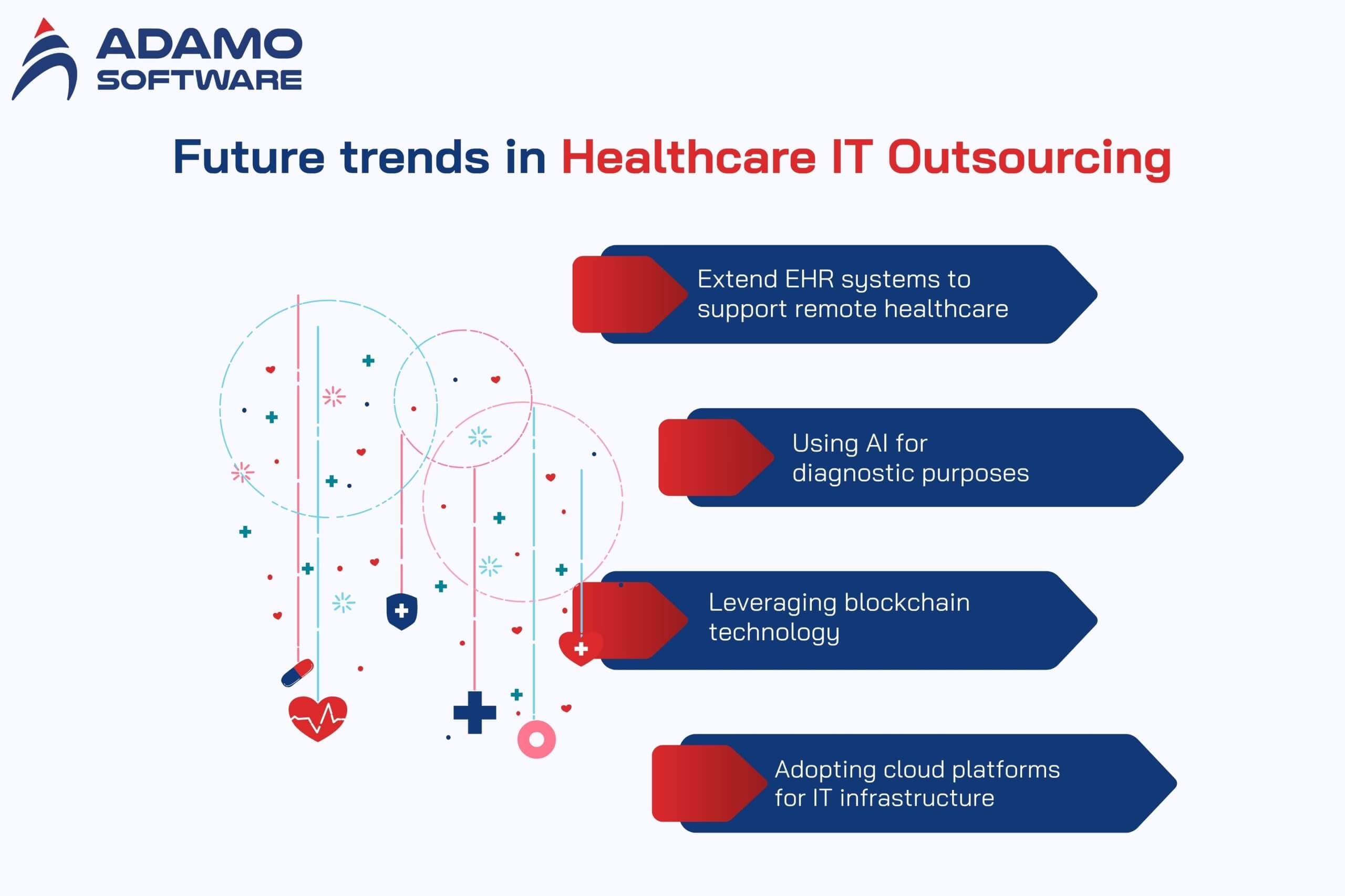
Extending EHR systems to support remote healthcare
Extending EHR systems to support remote healthcare is one of the prominent trends that influence the way healthcare organizations outsource outside staff to develop their healthcare software. This meets the patients’ needs for remote treatments and helps healthcare facilities maintain healthcare continuity.
By simplifying data administration and enabling remote access, teleconsultations, and remote patient care, patients receive easier and more convenient healthcare services.
Using AI for diagnostic purposes
Using AI for diagnostic purposes will also become a future trend that outsourcing healthcare software development providers must focus on. The outsourcing team must be proficient in adopting AI for diagnostic imaging and analyzing data to develop accurate machine learning algorithms.
Leveraging blockchain technology
Another notable trend in outsourcing healthcare software development is leveraging blockchain technology to enhance the security, transparency, and traceability of medical data. Blockchain helps to securely trade data and protect patient privacy during data sharing.
Adopting cloud platforms for IT infrastructure
Adopting cloud platforms for IT infrastructure is also among the outstanding trends in healthcare IT outsourcing. This helps healthcare facilities increase flexibility, scalability, and optimize operating costs. By migrating IT infrastructure to cloud platforms, you gain easy access to resources and services while ensuring data security and compliance.
You can also dive deep into Technology Trends in Healthcare industry here.
V. Final thoughts
In general, outsourcing healthcare software development is a cost-effective solution that allows healthcare organizations to access advanced technology and highly specialized teams. When cooperating with reliable partners, healthcare facilities can innovate faster, more efficiently, and be ready to adapt to future technology trends.

If you are looking for a service provider, Adamo Software can be your ideal choice. As one of Vietnam’s leading companies in technology, with many years of experience working with healthcare organizations, Adamo can help you develop your healthcare software quickly and effectively. Let’s see how we can provide outsourcing healthcare software development services!
- Consulting and designing on-demand healthcare software solutions.
- Ensuring the software complies with medical standards and is ready for deployment in real environments.
- Developing and integrating software with EHR/EMR systems.
- Building telehealth solutions, including scheduling, video calls, prescription management, and remote health monitoring.
- Providing post-implementation support and long-term maintenance.
Still hesitating whether to choose Adamo Software? Let’s contact us for more detailed information!
FAQs
1. Does outsourcing healthcare software development meet HIPAA requirements?
Yes, it does. Healthcare software development outsourcing is HIPAA compliant when the partner maintains rigorous data protection and follows necessary regulatory guidelines.
2. What is the impact of time zone differences on outsourcing collaboration?
Differences in time zones impact communication and project timelines. However, you can manage these challenges effectively through proper planning and collaboration tools.
3. What are unexpected expenses associated with outsourcing healthcare IT?
Hidden costs can include additional fees for scope changes, maintenance, and support. You may want to consider these costs to avoid unexpected experiences.
4. What are the potential risks involved in outsourcing healthcare software development?
When outsourcing healthcare software development, you may face data security breaches, regulatory non-compliance, and project delays due to miscommunication. To mitigate these risks, you need careful vendor selection and clear contracts.
5. How can these risks be effectively mitigated?
By choosing vendors with a proven healthcare track record, risks can be mitigated. Besides, you should also ensure they comply with all relevant regulations and maintain open communication throughout the project.



